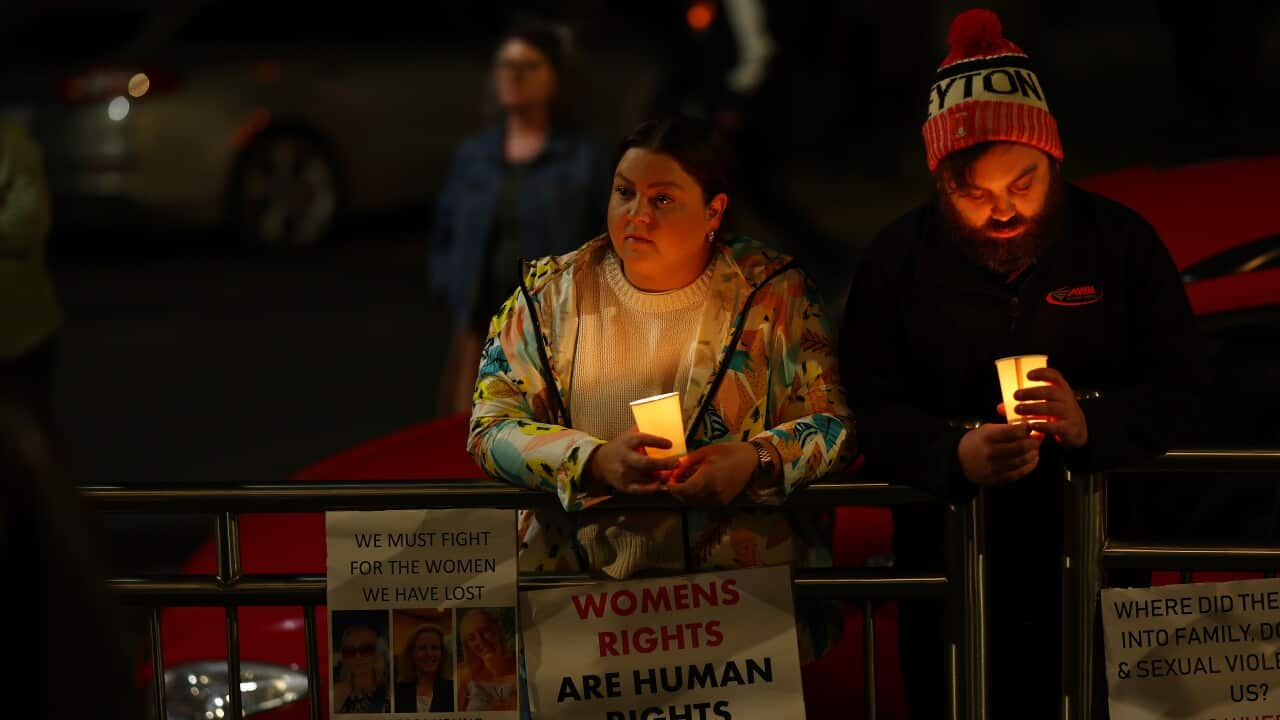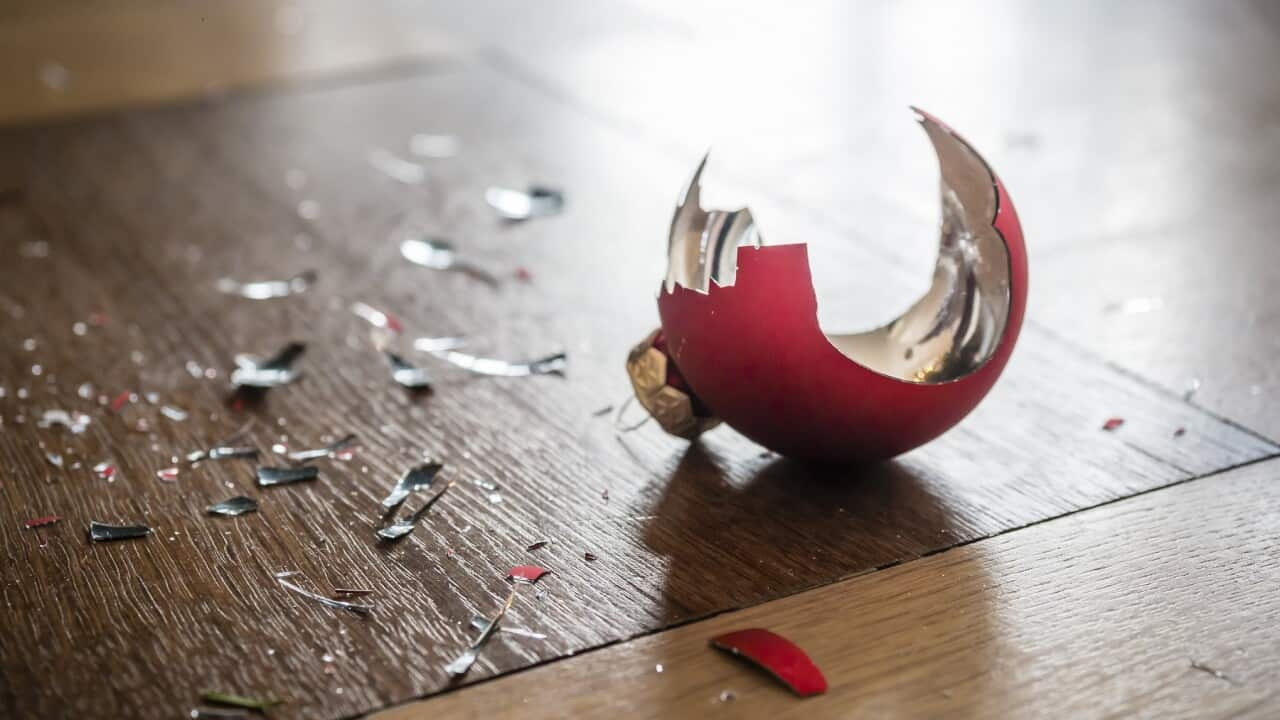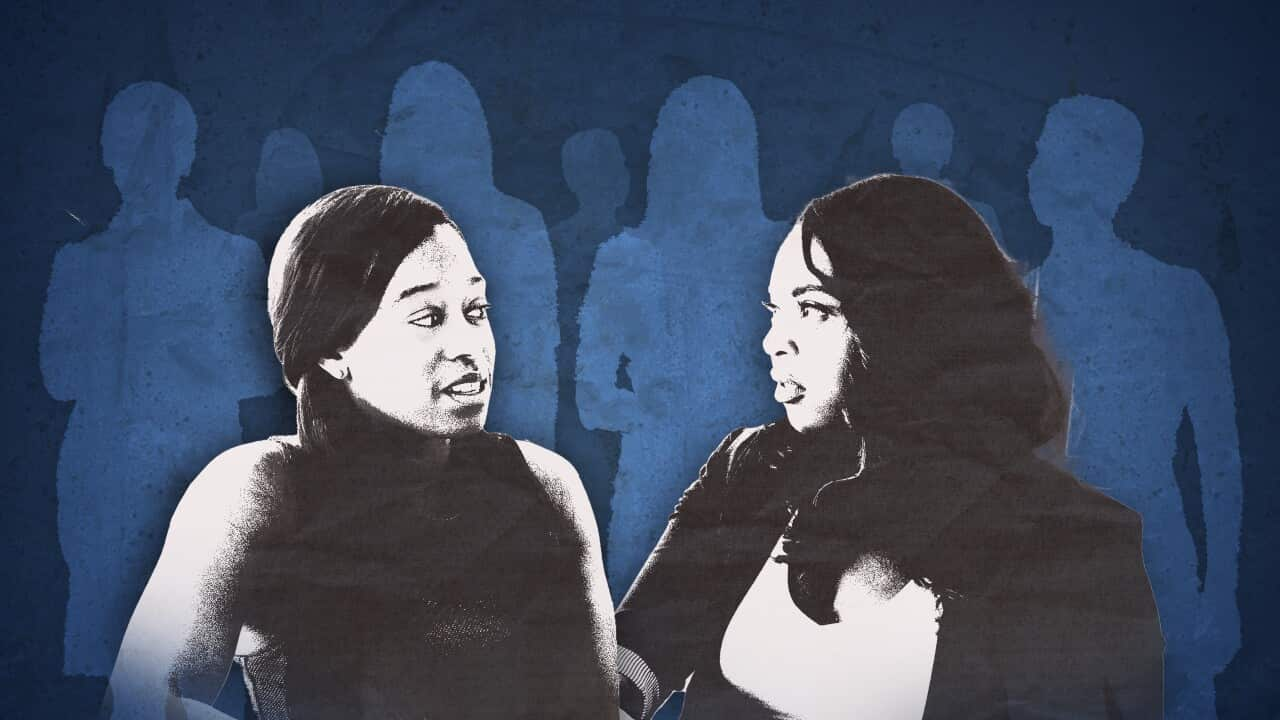This article contains references to domestic and family violence.
While Christmas is often a time of celebration, experts are warning it's also a period marked by increased risk of family and domestic violence.
Organisations working to end violence against women are encouraging men who are concerned about their behaviour to seek help — and for family and friends to look out for their loved ones — as new police data shows a rise in offending in Victoria across the festive season.
Phillip Ripper, chief executive of No To Violence — which works with men to end family violence, said: "Sadly, for what should be the festive season, a time for family and loved ones to come together ... for many families, it's not a time of celebration."
"We know that police call-outs increase at this time of year, particularly around Christmas Day and New Year's Day," he told SBS News.
According to Victoria's Crime Statistics Agency, there were 8,668 family violence incidents recorded across the state last December — an average of 279 per day.
On Christmas Day alone, the average increased by 33 per cent to 372 incidents, figures published last Tuesday show.
Family violence command assistant commissioner Lauren Callaway said: "Our frontline police are continuing to respond to increasing reports of family violence each year — with a spike occurring on Christmas Day."
She said perpetrators "use the time together to control or harm family members".
"Whether it's perpetrators breaching orders by either attending the victim’s home or using technology to make contact or committing assault — the behaviour is unacceptable and will not be tolerated."
According to the national prevention organisation Our Watch, similar spikes have been reported across the country over the festive season in past years.
Over the last eight years, police in NSW have responded to more family and domestic violence incidents on New Year's Day than on any other day of the year, NSW Police said, citing data from the state's Bureau of Crime Statistics and Research.
Karen Bevan, chief executive of Full Stop Australia, an organisation supporting people who experience sexual, family, or domestic violence, said: "These are serious numbers."
"They show us that there are people who are unsafe on Christmas Day, on Boxing Day, on New Year's Day and all the days in between.
"What we know is, the people who report to police are just the tip of the iceberg ... if that's the level of reporting we're seeing, then the level of distress and lack of safety in the community is very high indeed."
What can exacerbate violence over the festive season?
On average, one woman a week is murdered by her former partner, according to statistics cited by Our Watch. One in three Australian women have experienced physical violence, and one in five has experienced sexual violence.
Women are at least three times more likely than men to experience violence from an intimate partner.
While domestic violence refers to acts of violence between people who are or were in an intimate relationship, family violence also refers to acts between family members.
Evidence shows that most violence against women and their children is driven by gender inequality. However, certain issues can exacerbate violence.
Alcohol and drug use typically rise over the festive period, and both are known to increase the severity and frequency of violence, Our Watch said.
Ripper said people may feel increased stress over cost of living and family issues and also drink more and take more drugs during this time. But he stressed these are not the cause and that "violence is always a choice".
"Men must take responsibility for the choices they make — and make better choices," he said.
Our Watch chief executive Patty Kinnersly said the combination of alcohol and sexism and disrespect towards women must be addressed.
"There is no one solution to stopping men who choose to use violence. We need to challenge harmful stereotypes about male drinking cultures and men needing to be aggressive and in control," she said.
"We need to improve alcohol regulation in ways that help change the relationship between alcohol, masculine stereotypes and violence."
Services also facing 'enormous surges' in demand
Support services are also seeing "enormous surges" in demand across the country, Bevan said.
No To Violence has had a 40 per cent increase in calls to its national men's referral service from July to November — and Ripper expects this to increase over the festival period.
"That's a very short period of time and a really significant increase in demand," he said.
"We hope that's to do with more people reaching out, getting the support they need, but we fear it's actually a result of increased family violence across the community."
While a spike in police reports might fall on certain days over the festive period, Bevan said demand for services is more complex.
"Sometimes the demand is not on Christmas Day," she said.
"The tail end of demand continues into when people return to work because often people can't seek support because the person who is using violence is right there in front of them."
How to seek support
To those who feel unsafe this festive period, Bevan said: "We want you to be safe, and we want you to feel that you can reach out for support."
The government funds a range of national and state-specific helplines, including 1800RESPECT.
"But we will say to people, if you are scared for your safety, please contact emergency services to get that support."
Bevan said family and friends of victim-survivors can often be their "first responders" in disclosing an experience of violence.
"Being able to tell someone about the challenges you're facing when you're being subject to domestic and family violence, being able to open up without judgement, is such an important first step," she said.
"As family members, friends, and community members, we can just be alongside people ... You might like to ask: How safe do you feel? Or, would you like some help thinking through what you might like to do next?"
She encouraged loved ones to listen, avoid making assumptions — and reach out for support themselves.
Ripper urged men who use violence to seek help this festive season through services such as the Men's Referral Service.
"If you have had a history of problematic or tense relationships where you are concerned about your behaviour, where family violence has been present, get help now.
"Start reaching out."
If you or someone you know is impacted by family and domestic violence, call 1800RESPECT on 1800 737 732, text 0458 737 732, or visit . In an emergency, call 000.
, operated by No to Violence, can be contacted on 1300 766 491.













